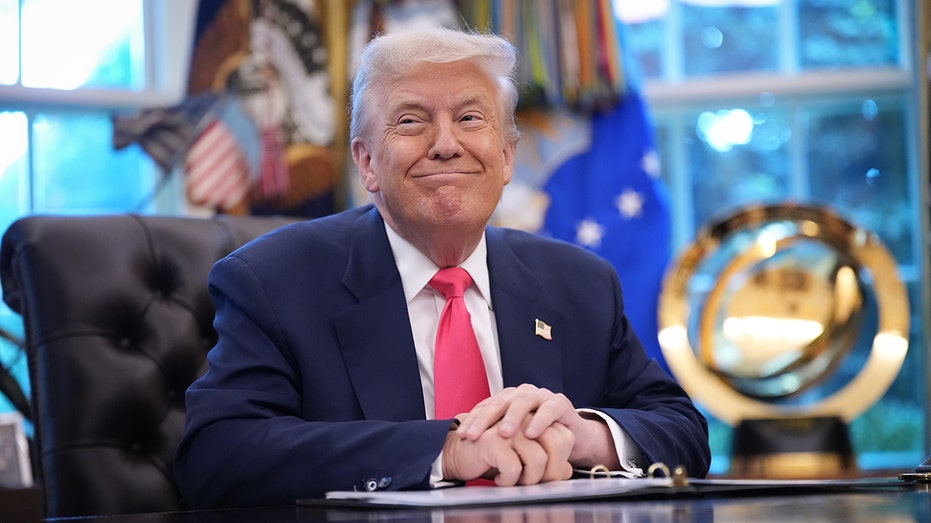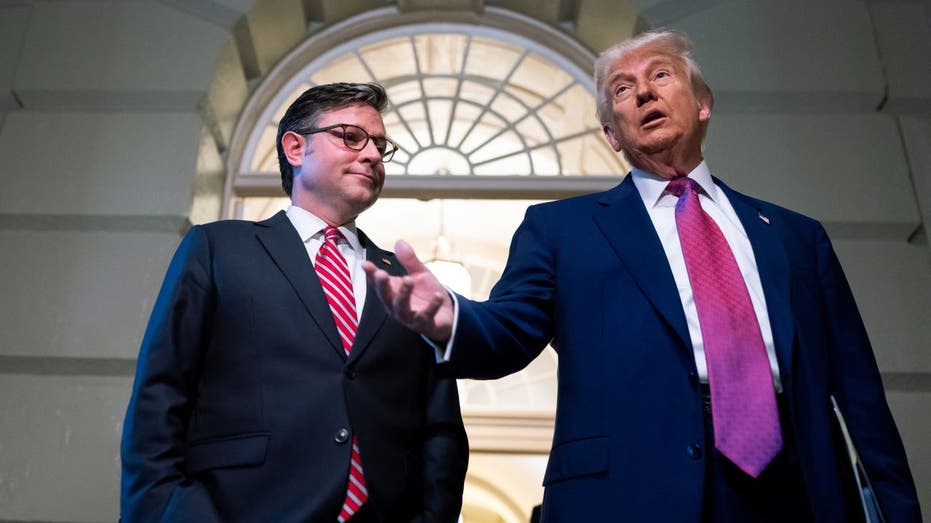

The Trump administration said on Friday that it projects federal deficits will be cut by half over the next 10 years, attributing the reductions to a sweeping package of spending cuts, new trade tariffs, and regulatory rollbacks.
In its upcoming fiscal year 2026 Mid-Session Review, obtained by Fox News Digital, the Office of Management and Budget (OMB) estimates that the government will accumulate $15.7 trillion in cumulative deficits between 2026 and 2035 — down from earlier forecasts of $31.5 trillion.
In other words, President Donald Trump's budget officials are anticipating a 50% reduction in the nation's deficit over the next decade.

President Donald Trump smiles in the Oval Office on Aug. 14, 2025 in Washington, D.C. (Andrew Harnik/Getty Images / Getty Images)
A senior administration official, who spoke on the condition of anonymity, told Fox News Digital that Trump's "pro-growth tax reform, fair and reciprocal trade, unleashing American energy, cutting regulations and restraining spending boost economic growth and reduce deficits."
The OMB largely attributes the drop from $31.5 trillion to $15.7 trillion to Trump's landmark One Big Beautiful Bill Act (OBBB) that was passed on July 4.
Administration officials estimate the legislation alone will save nearly $2 trillion, with most of the savings stemming from Medicaid reform.
The administration says the law will save about $1 trillion by slowing the growth of Medicaid, the health program for low-income Americans, by tightening eligibility rules and requiring states to cover a larger share of the costs. Supporters argue these changes will make Medicaid more sustainable while keeping it available to disabled people, children, pregnant women, and working adults.
The measure also reins in student loan forgiveness and toughens Supplemental Nutrition Assistance Program (SNAP) rules.

President Donald Trump and House Speaker Mike Johnson speak to reporters ahead of a meeting at the Capitol in Washington, D.C., on Tuesday, May 20, 2025. (Nathan Howard/Bloomberg via Getty Images / Getty Images)
In addition to the savings projected from the OBBB, the budget forecast also attributes the $15.8 trillion reduction in the deficit over the next 10 years to Trump’s sweeping trade policies.
Central to Trump’s economic agenda, his trade policy makes heavy use of tariffs as a tool to generate revenue and exert leverage over foreign trading partners.
The administration says the U.S. has collected $136 billion in customs duties from the start of fiscal year 2025 through July. The figure represents a 116% increase compared to the same time period last year.
The projections also expect tariff revenues will add nearly $5 trillion over the next decade, which is about $3.9 trillion more than baseline estimates.

A container ship sails out of the port in Qingdao, in China's eastern Shandong province on Aug. 7, 2025. (STR/AFP/Getty Images / Getty Images)
And while Trump administration officials argue tariffs will reduce chronic trade imbalances, revive U.S. domestic manufacturing, and strengthen national security, critics warn that higher tariffs could raise costs for American consumers and invite retaliation abroad, risks not addressed in the budget’s assumptions.
The projections assume full implementation of Trump policies without legal, political, or economic pushback. Outside analysts warn the forecast depends on aggressive assumptions that may prove difficult to realize.
"The Congressional Budget Office (and several other analysts) projects deficits to increase significantly, not fall, if our current trajectory remains unchanged. For instance, the administration's OBBBA itself is supposed to add to the deficit, not reduce it," Jai Kedia, a research fellow at the Cato Institute's Center for Monetary and Financial Alternatives, told Fox News Digital.
The Congressional Budget Office declined to comment on the figures presented in this story.
Still, Kedia added that while the figures seem "wildly optimistic," the Trump administration's "efforts to reduce federal debt are welcome, and it would be great if we could return to a sensible spending path."
